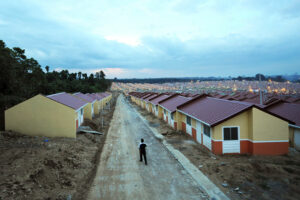PROPOSALS to increase capital gains tax (CGT), donor’s tax and estate tax could make land more expensive and weaken investor activity, the real estate industry said.
“Attempts to impose further tax burdens on property transactions will lead to spiraling land prices, economic destabilization, and loss of employment opportunities,” Chamber of Real Estate and Builders’ Associations, Inc. (CREBA) said in a statement.
Last month, the Department of Finance (DoF) retracted its proposed amendments to the Capital Markets Efficiency Promotion Act (CMEPA), citing a favorable revenue performance in the first quarter.
The DoF earlier sought to replace the CMEPA with the Government Revenues Optimization through Wealth Tax Harmonization bill.
The draft bill proposes a temporary hike in the rates for capital gains on real property, donor’s tax, and estate tax to 10% between 2025 and 2030. Beginning 2031, the rates will be reduced to 6%.
Any significant tax or imposition that impacts land transactions would have a “tidal effect across the economic spectrum,” according to CREBA National President Noel Toti M. Cariño.
He called the property industry heavily taxed and highly regulated, with any further impositions “seriously dampening income and employment generating investments, whether foreign or domestic.”
CREBA has a membership of about 3,000, consisting of companies involved in land and housing development, building construction, and allied industries.
In a separate statement, the National Real Estate Association (NREA), the Subdivision and Housing Developers Association (SHDA), and CREBA said increasing the capital gains tax rate would also drive up housing costs.
“As the CGT is a pass-on tax, the consequent rise in land costs will inevitably drive up production costs, thus further impairing housing affordability, particularly for the lower-income segments which account for the bulk of the housing backlog,” CREBA said, citing its joint findings with the NREA and SHDA.
“The resulting inability of low- and middle-income earners to absorb the tax will prevent housing developers from embarking on housing projects catering to these market segments,” according to the groups.
A capital gains tax hike could also potentially slow real property development activity, destabilizing the construction and property development industries, to the detriment of laborers and temporary workers, they added.
Higher land costs would also translate to higher infrastructure development costs, further burdening taxpayers, they said.
Mr. Recto said the government currently has no intention to impose new taxes or revenue measures, and will rely instead on nontax revenue to meet its fiscal goals this year.
In the first quarter of 2025, tax collections rose 13.55% to P931.5 billion following stronger tax administration and enforcement, the DoF said. — Beatriz Marie D. Cruz
